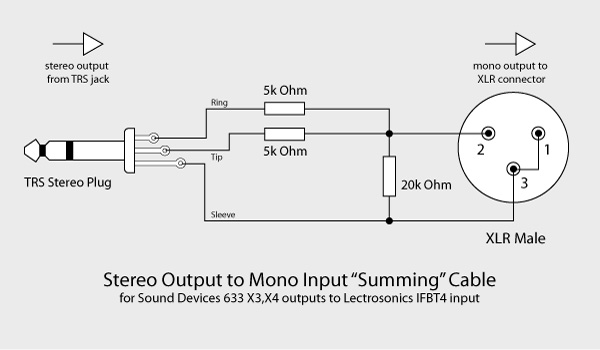trans4funks1
Well-known member
- Joined
- Feb 4, 2013
- Messages
- 328
Hello,
I need to build a cable that will "sum" a stereo output to mono to facilitate interconnection of two pieces of gear I want to use.
I found some instructions at the Rane website describing the layout, but I would like to figure out the wattage rating that is appropriate for my application.
I made this drawing to explain what I hope to assemble:

I will use it with either a line level TRS output and or a Headphone out output and send it to a device that can accept a line level signal.
The primary use is for a device with an output rating as follows:
Output: 100ohm outputs, unbalanced stereo for use with greater than 6kOhm inputs
connected to another device with an input rating as follows:
Input impedance: 1kOhm
Can someone help me figure out the wattage ratings appropriate for the resistors?
I see that the impedance bridge between the two devices is not ideal. Is it possible to select another resistance value that helps with that specific issue?
Thank you.
I need to build a cable that will "sum" a stereo output to mono to facilitate interconnection of two pieces of gear I want to use.
I found some instructions at the Rane website describing the layout, but I would like to figure out the wattage rating that is appropriate for my application.
I made this drawing to explain what I hope to assemble:

I will use it with either a line level TRS output and or a Headphone out output and send it to a device that can accept a line level signal.
The primary use is for a device with an output rating as follows:
Output: 100ohm outputs, unbalanced stereo for use with greater than 6kOhm inputs
connected to another device with an input rating as follows:
Input impedance: 1kOhm
Can someone help me figure out the wattage ratings appropriate for the resistors?
I see that the impedance bridge between the two devices is not ideal. Is it possible to select another resistance value that helps with that specific issue?
Thank you.


